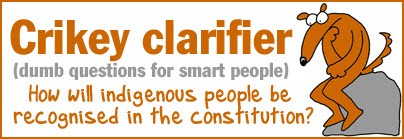Prime Minister Julia Gillard yesterday sparked a debate when she announced the federal government will seek to recognise Aboriginal and Torres Strait Islander people in the constitution. Currently, there is no mention of indigenous people in the document, with Gillard claiming that recognition will help to build a “nation based on strong relationships and mutual respect”.
So far there has been bipartisan support for a referendum on the issue, but will that filter down to the community? And will constitutional change wipe out indigenous disadvantage? Crikey went looking for answers.
What exactly is being proposed?
That isn’t exactly clear at this stage. Gillard will establish an “expert panel”, which will begin laying the groundwork for achieving a “nationwide consensus” for constitutional change.
The panel will include indigenous and community leaders, constitutional experts, and parliamentary members. It is due to report back in December 2011 with its recommendations. Gillard has said that a referendum will be held at or before the next federal election. Whether this involves recognition in a preamble or the body of the constitution itself will be decided by the panel.
What do the indigenous community want?
Professor Marcia Langton says any effort to recognise indigenous people should be “more than a preamble” and should involve recognition in the body of the constitution.
Aboriginal and Torres Strait Islander Social Justice Commissioner Mick Gooda says giving Australians the chance to say ‘yes’ is “an opportunity to demonstrate goodwill and innate decency”.
Other members of the indigenous community claim there are more pressing matters for the federal government to address than a symbolic change to the constitution.
Referendums often fail — how come?
It’s hard to pinpoint exactly why so many referendums get shot down, but one factor is the onerous conditions required to change the constitution. For a referendum to succeed it must attract the support of a majority vote nationally, as well as a majority of votes in a majority of states.
How many have succeeded?
There have been 44 referendums since federation, of which eight have been successful.
When was the last one held?
A two-question referendum was held in 1999. The first question asked whether Australia should become a republic, while the second asked whether a preamble should be inserted before the constitution.
Both were soundly rejected at the ballot box, failing to receive a majority nationally and in any state.
Didn’t John Howard try to recognise Aboriginal and Torres Strait Islanders in the ’99 preamble?
Co-written by poet Les Murray and John Howard, the preamble said that Aboriginal and Torres Strait Islander people should be recognised “for their deep kinship with their lands and for their ancient and continuing cultures which enrich the life of our country”.
Just 39.34% voted nationally for the preamble, while no states recorded a majority of votes. At the time, most blamed the preamble’s failure on the fact it played second fiddle to the republic questions posed at the same referendum.
Murray disowned the preamble after it failed, saying it was watered down, while members of the indigenous community claimed there was a lack of consultation over the wording.








Unless it’s possible to get agreement among all major parties, PLUS the agreement of a clearlysignificant proportion of the ‘indigenous’ population, anything politicians do is primarily publicity seeking.
am I alone in thinking that this will just polarise the Australian people into ‘Aboriginal’ and non-Aboriginal’.
As far as I’m concerned I’m as Australian as my best mate who has Chinese parents, and another friend who is of Aboriginal descent.
I don’t see why any of us three should be specifically mentioned in the constitution because we are all the same really.
True,Hugh, but once people hava a ‘sacred’ cause, emions take over.
And if you have a faulty computer and don’t check your typing before you hit the ‘post’ button, the letters ‘ot’ can drop out ofa word.